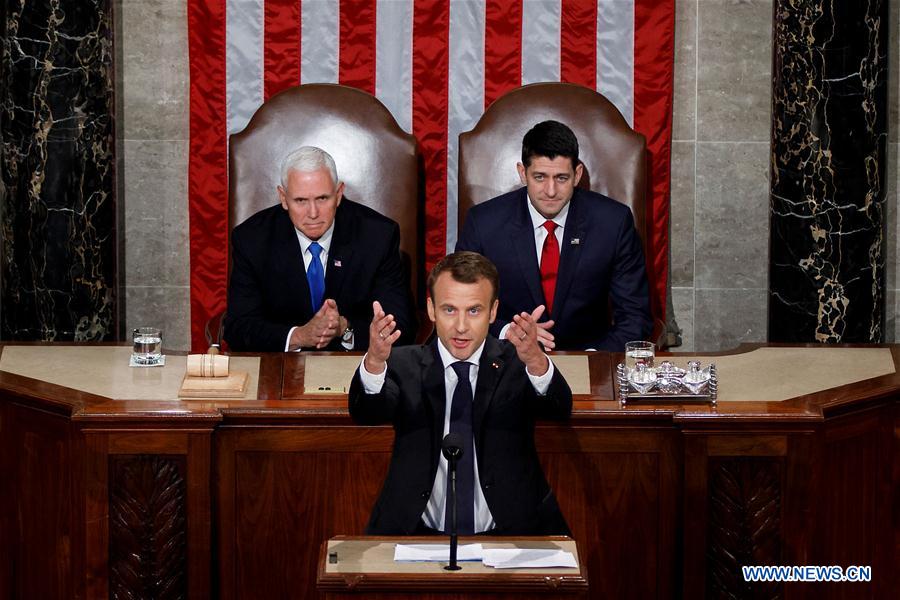Macron defends multilateralism, globalization, Iran deal in speech to US Congress


WASHINGTON - Without directly chiding Donald Trump, French President Emmanuel Macron on Wednesday forcefully challenged many of his US counterpart's policies, urging Washington to embrace multilateralism and economic globalization.
In a speech to a joint meeting of Congress, Macron called on American lawmakers to construct a "new breed of multilateralism" in the face of urgent global threats -- from climate change to terrorism.
His emotional appeal to US lawmakers, as well as the broader American public, came as he capped a three-day state visit to the United States that also included closed-door negotiations on the fate of the Iran nuclear deal.
MULTILATERALISM VS ISOLATIONISM
In his speech, Macron advocated multilateralism, which his US counterpart Donald Trump has not been quite a fan.
"We can choose isolationism, withdrawal and nationalism. This is an option. It can be tempting to us as a temporary remedy to our fears," he said. "But closing the door to the world will not stop the evolution of the world. It will not douse, but inflame the fears of our citizens."
"I'm convinced that if we decide to open our eyes wider, we will be stronger, we will overcome the dangers, we will not let the rampaging work of extreme nationalism shake a world full of hopes for greater prosperity," he said.
"It is a critical moment. If we do not act with urgency as a global community, I am convinced that the international institutions, including the United Nations and NATO, will no longer be able to exercise a mandate and stabilizing influence," he added.
In the speech, Macron promoted what he called "a new breed of multilateralism."
"We can build the 21st century world order based on a new breed of multilateralism, based on a more effective, accountable and results-oriented multilateralism, a strong multilateralism," he said.
"This strong multilateralism will not outshine our national cultures and national identities. It is exactly the other way around: A strong multilateralism will allow our cultures and identities to be respected, to be protected and to flourish freely together."
Despite his apparent failure to convince Trump back to the Paris climate accord, Macron said "I'm sure one day the United States will come back and join the Paris Agreement."
"I'm sure we can work together to fulfill with you the ambitions of the global compact on the environment," he added.
ECONOMIC GLOBALIZATION VS "COMMERCIAL WAR"
Speaking of the tilt towards trade protectionism that Washington has been increasingly interested in, Macron defended globalization against nationalism.
"I believe in the power of intelligently regulated market economies. We are experiencing the positive impact of our current economic globalization, with innovations, with jobs creations," he said. "We see, however, the abuses of globalized capitalism and digital disruptions."
He urged "the opposite of massive deregulation and extreme nationalism" to counter these challenges.
"Commercial war is not the proper answer to this evolution," he said. "A commercial war ... is not consistent with our mission, with our history, with our current commitments for the global security. At the end of the day, it will destroy jobs, increase prices and the middle class will have to pay for it."
He believed that the two nations can build the right answers to Trump's concerns regarding trade imbalances, excesses and overcapacities by negotiating through the World Trade Organization and building cooperative solutions.
"We wrote these rules. We should follow them," said the French leader.
NEW IRAN DEAL
In his address, Macron urged the United States not to walk away from the Iran nuclear agreement and, again, advertised his proposal to work with Russia and Turkey to forge a new deal on the Iran nuclear issue.
Saying the new deal "more comprehensive," Macron highlighted again its four "pillars" -- to block any nuclear activity of Iran until 2025, to make sure that there is no Iranian nuclear activity in the long run, to put an end to Tehran's ballistic activities in the region, and to generate the conditions for a political solution to "contain" Iran in the region.
"These four pillars ... cover the legitimate fears of the United States and our allies in the region," he said. "I think we have ... to be sure that whatever the decision of the United States will be, we will not leave the floor to the absence of rule, we will not leave the floor to this conflict of powers in Middle East."
Saying that "Iran shall never possess any nuclear weapons," Macron noted that the West's policy "should never lead us to war in the Middle East. We must ensure stability and respect sovereignty of the nations, including that one of Iran."
"Let us not replicate past mistakes in the region. Let us not be naive on one side. Let us not create new walls ourselves on the other side," he said.
The statement echoed his words at Tuesday's joint press conference with Trump, when he said that "we do not want to repeat the mistakes of the past. Each time we tried to unilaterally replace the sovereignty of the people, we brought about some more terror."
He also defended the existing framework of the Iran nuclear deal, or the JCPOA, saying it worked to control the nuclear activity of Iran.
"We signed it at the initiative of the United States. We signed it, both the United States and France. That is why we cannot say we should get rid of it like that," he said. "We should not abandon it without having something substantial and more substantial instead ...That's why France will not leave the JCPOA."























